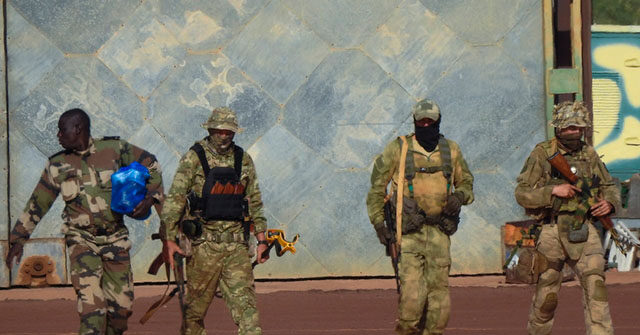The “Africa Corps,” the revised version of the infamous Wagner Group mercenary outfit founded by the late Yevgeny Prigozhin, suffered a disastrous defeat in Mali at the hands of jihadi insurgents this month.
The insurgents released gruesome footage of their slain adversaries this week.
France24 News noted that in some of the video clips released by the Jama’at Nusrat ul-Islam wa al-Mulsimin (JNIM) insurgents, the jihadis refer to the slain mercenaries as “Wagner.”
The videos depict the aftermath of a slaughter, with dead soldiers splayed around a destroyed Russian military vehicle. JNIM claimed another military vehicle, 16 Kalashnikov rifles, two PK machine guns, ammunition, and “various other pieces of equipment” were captured after the engagement. The jihadis provided photographs of their loot.
No official casualty count has been provided by the Africa Corps, but JNIM sources claim up to 40 people were killed in the attack it documented, at least 14 of them Russians. The attack took place when an Africa Corps convoy was ambushed in territory that has long been controlled by the insurgents. The government of Mali has refused to comment on the incident, beyond confirming that the ambush occurred.
Russian military bloggers, many of whom romanticized the Wagner Group as tough soldiers of fortune, were appalled by JNIM’s videos. Some called it a “disaster” for Wagner’s successor organization. Others criticized Africa Corps leaders for foolishly underestimating their adversaries and failing to provide air support.
One Russian milblogger berated the Africa Corps for failing to learn from the Wagner Group personnel it inherited.
“We don’t listen to the Wagner idiots, who walked this land for years, who took their punches and know how to work here and how to work with the local population. We are too smart, we went to military school, we have experience on paper that dates back to Chechnya,” he imagined the new leadership saying.
The Wagner Group was a private military company founded by Yevgeny Prigozhin and former Russian military intelligence officer Dmitry Utkin in 2014. Prigozhin was close to Russian President Vladimir Putin at the time, having risen from humble origins as a violent street thug to become a wealthy oligarch by providing catering services to government agencies.
Prigozhin plowed some of the fortune he made as “Putin’s Chef” into his new mercenary outfit, which quickly earned a reputation for ruthlessness. Many of Wagner’s fighters were convicted criminals recruited from Russian prisons.
Wagner’s exploits were condemned by human rights organizations around the world, and critics wondered just how “private” the company really was, since its operations tended to support Putin’s strategic goals.
The Wagner Group arguably relied more on sadistic brutality than military skill to develop its fearsome reputation. In February 2018, it made the mistake of teaming up with forces loyal to Putin-supported Syrian dictator Bashar Assad to attack a position held by U.S. special forces and their Kurdish and Arab allies. The Wagner unit was completely obliterated, to such an embarrassing degree that the Russian government hid the casualty count until the grieving families of the dead mercenaries were unwilling to remain silent.
The Syrian debacle spelled the beginning of the end of the Wagner Group, as Prigozhin was soured by the experience and grew increasingly critical of Putin. Prigozhin eventually mutinied against Putin, seized control of a Russian city, and sent Wagner troops to occupy Moscow. The insurrection was aborted, and both Prigozhin and his partner Utkin were killed in a highly suspicious plane crash in August 2023.
The Wagner Group was too useful for Putin to discard, especially since the mercenaries had established lucrative relationships with some Third World governments. One of the group’s major clients was Mali, which has been ruled by a military junta since 2020. The junta relied on Wagner’s support – supposedly as “instructors” – to fight against JNIM, an offshoot of al-Qaeda active throughout the Sahel region.
The Russian government remodeled the Wagner Group as the “Africa Corps,” a paramilitary organization more overtly managed by the Russian Defense Ministry. Many Wagner employees were folded into the Africa Corps, although some Wagner operatives are still flying the old Prigozhin flag.
Wagner was officially replaced by the Africa Corps in Mali in June. The government of the Central African Republic (CAR), another longtime Wagner client, said last week that Moscow is heavily pressuring it to “transition” from Wagner holdouts to the Africa Corps.
The CAR has resisted these demands because it feels the Wagner Group is more effective, and more “feared operationally,” than the Africa Corps. CAR officials also complained that Moscow demanded much higher payments for the services of the Africa Corps, including millions of dollars in fees paid directly to the Russian government.
Read the full article here


